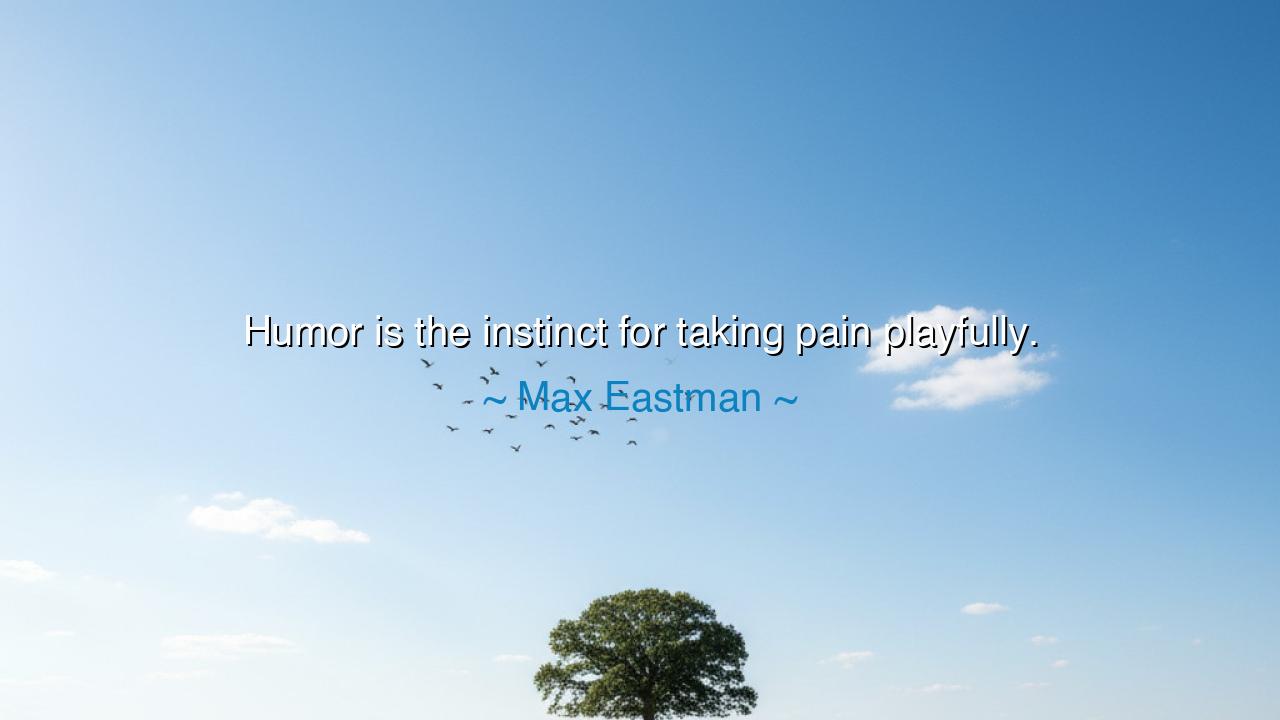
Humor is the instinct for taking pain playfully.






Listen, children of the ages, and mark the wisdom of Max Eastman, who spoke: “Humor is the instinct for taking pain playfully.” Know that in the hearts of men and women, there dwells a power more ancient than swords, more enduring than gold—the power to transform suffering into light, to meet adversity not with despair, but with the gentle, defiant spark of humor. Pain, though inevitable, is softened when met with laughter; it is tamed when the spirit refuses to bow entirely beneath its weight.
In the halls of history, warriors and poets alike have understood this instinct. The Spartan soldiers, marching into the storm of battle, often sang and jested even as death loomed near. Their laughter was not frivolity, but a shield, a sacred expression of courage. They understood that to face suffering with a playful heart is to assert dominion over it, to claim freedom even in the shadow of doom. Thus, humor becomes the vessel through which the soul rises above the inevitable trials of life.
Consider the trials of Abraham Lincoln, whose heart bore the weight of a divided nation and personal sorrow unending. Friends recall his frequent tales, his gentle jests in the darkest moments of the Civil War. Through his humor, he transformed grief into resilience, fear into resolve, and the crushing burden of leadership into a shared human experience. In laughter, he discovered the instinct that Eastman describes: the ability to meet pain not with surrender, but with a playful embrace that softens the heart and strengthens the will.
Even in the trenches of the Great War, where mud and blood stained the earth and death hovered like a silent specter, soldiers found the instinctive power of humor. Dark jokes, absurd anecdotes, and playful mockery of circumstance allowed men to endure the unendurable. In laughter, they claimed a small measure of triumph over the chaos surrounding them, asserting the indomitable spark of humanity. Pain, though present, became bearable; despair was tempered by the instinct to play with it.
Yet, the wisdom of Eastman is subtle. Humor is not the absence of suffering; it is the conscious choice to meet it with grace. It does not diminish the weight of pain, nor deny its reality. Rather, it reveals a deeper truth: that the human spirit, when armed with playfulness, may encounter adversity without breaking. This instinct is a gift of the soul, a natural strategy woven into the fabric of life, allowing men and women to endure what might otherwise crush them.
History offers another illustration in the life of Mark Twain. Facing personal tragedies—the loss of children, the betrayal of trust, the sting of poverty—he wielded humor as both sword and shield. His quips and observations, though often tinged with sorrow, conveyed a spirit that refused to bow. Each jest, each playful remark, was a declaration: pain may visit, but it shall not master the heart. Thus, the instinct to laugh at suffering becomes a means of liberation, a pathway to resilience.
Children of the ages, learn this lesson well: meet your trials with the instinct of humor. Observe the hardships that beset you, and discover within yourself the capacity to approach them playfully. Transform adversity into insight, discomfort into amusement, and sorrow into a teacher whose lessons are softened by laughter. In doing so, you fortify the spirit, cultivate endurance, and discover that even in suffering, joy may still dwell.
Practical action follows this wisdom. When pain comes, seek its lighter aspect; tell a story, share a jest, or observe the irony of circumstance. Cultivate the habit of playful reflection, allowing humor to be your companion in hardship. Train your spirit to respond not with fury, not with despair, but with the instinct Eastman revealed—a natural, joyous rebellion against suffering. In this way, you embrace the power of humor, and in laughter, find the strength to endure all trials of life.






AAdministratorAdministrator
Welcome, honored guests. Please leave a comment, we will respond soon